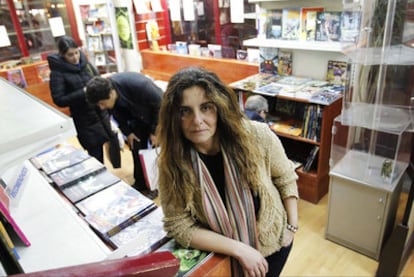End of the adventure for ground-breaking Madrid comic store
Storeowner blames the internet for complete loss of business
Neither the brute force of the Hulk nor the stealth of Spider-Man can help. Not even the dirty tricks of the Joker can solve the problem. On Thursday, after almost 30 years next to Madrid's famous Plaza Mayor, the legendary comic store El Aventurero closed its doors forever.
"It's an accumulation of crises: one of paper, the book, the physical medium or whatever you want to call it, and one of unemployment," explained Ana Faraco, whose father was fond of comics and opened the store in 1983.
Then it was just a library with a large comics section. He named the store after a magazine that had printed the adventures of characters like Tarzan and Flash Gordon since the 1930s.
"Business was in full swing and there was Madrid Cómics and us; downstairs we had parties and exhibitions, and cartoonists like Ana Juan and Kiko Feria came," said Faraco, surrounded by signs announcing liquidation sales up to 50 percent. With the arrival of commercial centers like Fnac, El Aventurero ceased to be anything special.
But special it was; its history is like that of the comic.
"From the boom of the 1980s, it declined until the end of the 90s, when they invented the graphic novel for people who were embarrassed to buy comics all the time," said Aitor Muñoz somewhat sardonically; years ago he went from being loyal client to shop assistant.
"My father was number one," he beamed. Indeed, Muñoz's father was literally the first person to buy anything the day the store opened.
El Aventurero had its moments of glory when comics such as V for Vendetta , Watchmen and Maus and character figurines sold like hot cakes.
"But in the end, it just went out of style," said Muñoz. "It became much cheaper to buy them from abroad on the internet."
The shop assistant explains that when Panini bought the rights from Marvel and decided to announce the publication dates, the business changed radically.
"People used to come in every day for five minutes to see what had come out; after that, they stopped coming to look and we stopped recognizing our customers to the point where we didn't know half of them."
When the editors decided to sell directly online, the in-store comic business received a fatal blow.
"Modernity is sitting poorly with us," admitted Muñoz.
Faraco says that the last few days before closing were very difficult. Standing amidst piles of merchandise that will never sell, Muñoz adds that many people have come in "to say goodbye and some of them left crying." Inside the shop, around 20 people, mostly gray-haired men or adolescent boys, were making their last purchases.
As for what comes next, the shop assistant admitted he did not have a plan B. One wonders who could rush in to save them from this pretty pickle just in the nick of time? "Superman," Muñoz said sadly. "He never fails."

Tu suscripción se está usando en otro dispositivo
¿Quieres añadir otro usuario a tu suscripción?
Si continúas leyendo en este dispositivo, no se podrá leer en el otro.
FlechaTu suscripción se está usando en otro dispositivo y solo puedes acceder a EL PAÍS desde un dispositivo a la vez.
Si quieres compartir tu cuenta, cambia tu suscripción a la modalidad Premium, así podrás añadir otro usuario. Cada uno accederá con su propia cuenta de email, lo que os permitirá personalizar vuestra experiencia en EL PAÍS.
¿Tienes una suscripción de empresa? Accede aquí para contratar más cuentas.
En el caso de no saber quién está usando tu cuenta, te recomendamos cambiar tu contraseña aquí.
Si decides continuar compartiendo tu cuenta, este mensaje se mostrará en tu dispositivo y en el de la otra persona que está usando tu cuenta de forma indefinida, afectando a tu experiencia de lectura. Puedes consultar aquí los términos y condiciones de la suscripción digital.








































